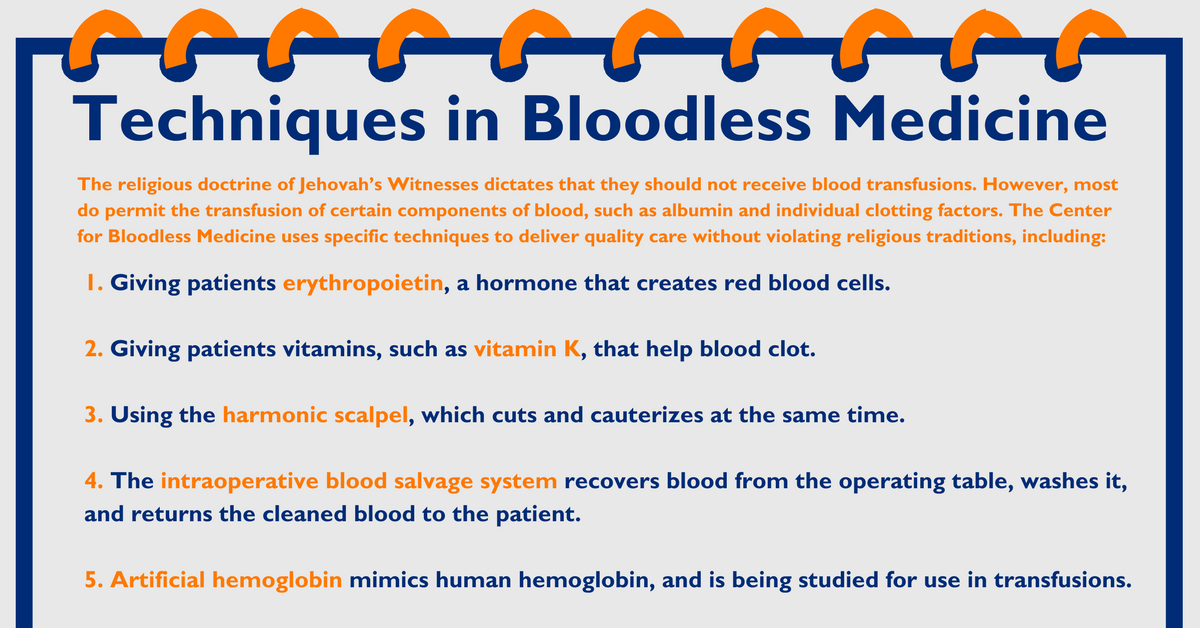The concept of bloodless medicine first arose in the 1970s, when Denton Cooley, the legendary Johns Hopkins University School of Medicine alumnus and cardiac surgeon, performed operations on a group of patients that most other doctors turned away: Jehovah’s Witnesses. According to their doctrine, Jehovah’s Witnesses are not permitted to receive blood transfusions, largely due to the organization’s interpretation of specific verses of the Old and New Testament. In particular, the religion cites Genesis 9:4, Leviticus 17:10, Deuteronomy 12:23, and Acts 15:28 and 29 as clearly commanding of abstinence from blood. However, Jehovah’s Witnesses do receive and encourage all other forms of medical care, which brings about a complex situation: How does one conduct surgery or other operations without the supplementation of outside blood to restore blood volume, maintain hemoglobin levels required for oxygen transport and replenish other important coagulation factors?
This is a question that the Center for Bloodless Medicine and Surgery answers every day. Steven Frank, director of the center, describes the mechanism of providing bloodless care to patients: “The way we do this is to conserve blood by reducing or eliminating bleeding by stimulating the body to make its own blood cells at an accelerated rate, and by recycling blood that patients lose during surgery and giving them back their own blood.”
Creating the Right Blend
Blood is a mixture of a variety of different components, including red blood cells, white blood cells, platelets, plasma proteins and clotting factors. Although Jehovah’s Witnesses do not allow the transfusion of whole blood, most do permit the transfusion of certain components of blood, such as albumin and individual clotting factors. By taking advantage of this, the center can provide alternative routes of care.
One such example includes giving patients erythropoietin, a hormone responsible for creating red blood cells, before and after surgery to stimulate the production of blood in anticipation of blood loss. Patients may also receive other vitamins, such as vitamin K, that are critical for the formation of blood components. Blood loss can be further minimized by the use of advanced tools, such as the harmonic scalpel, a type of scalpel that cuts and cauterizes at the same time. Additionally, technologies such as the intraoperative blood salvage system can actually recover lost blood from the operating table by washing the red blood cells with saline solution and returning the whole blood to the patient after the impurities and waste components have been removed.
Finally, although still in the development phase, some research labs are investigating the efficacy of artificial hemoglobin synthesized from various chemical compounds called hemoglobin-based oxygen carriers that mimic naturally occurring human hemoglobin, which can then be used for transfusion. These are just a few of the techniques that the center uses to ensure that patients who refuse or cannot take blood transfusions still have successful outcomes. The Center for Bloodless Medicine and Surgery at Johns Hopkins is one of the few centers across the country fostering innovation in the field of blood management. Aligning with Johns Hopkins’ commitment to outstanding medicine, the center applies cutting-edge technology to allow patients of all backgrounds to receive world-class care.
References
- Doyle, D. John. "Blood Transfusions and the Jehovah's Witness Patient." American Journal of Therapeutics 9.5 (2002): 417-24. Web.
- Frank, Steven, MD. "Bloodless Medicine and Surgery: Top 10 Things to Consider." Anesthesiology News (2016): n. pag. Web.
- Sarkar, Suman. "Artificial Blood." Indian Journal of Critical Care Medicine 12.3 (2008): 140. Web.
- "Why Don't Jehovah's Witnesses Accept Blood Transfusions?" JW.ORG. N.p., n.d. Web. 24 Mar. 2017.
Related Content
- Watch: Tammy, a Jehovah's Witness, tells her bloodless medicine story.
- Watch: Bloodless Medicine and Surgery: What You Need to Know | Steven Frank, M.D.
- Visit our Health Library to learn more about how blood transfusions work.

Is Dr. Cooley the same doctor who's name is one of Thalessemia;s names, Cooley's Anemia?
Hi Maryann!
Thanks for your comment - actually, Cooley's Anemia is named after the pediatrician Thomas Benton Cooley, while Dr. Cooley mentioned above is Denton Cooley, the cardiothoracic surgeon.
John Hopkins Hospital staff: Thank you for helping JW's to remain loyal and obedient to our Creator in regards to abstaining from blood. Whatever Jehovah God causes to become ALWAYS ends up to be beneficial and good toward mankind. This is based on love for us, as we are his children. You can be sure that our Creator is very pleased with your efforts, and so are we. Sincerely,
Barbara, one of Jehovah's Witnesses
Comments are closed.